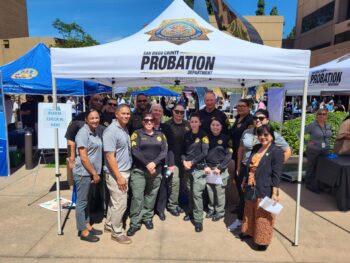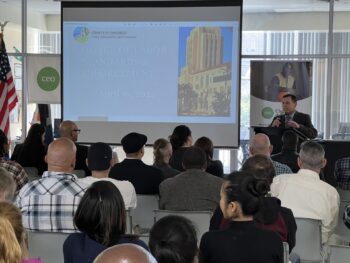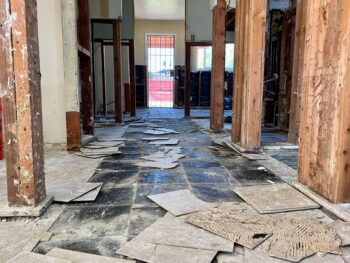Six probation youth, including former gang members, are putting themselves on a path to a brighter future with a new Life Skills program that exposes them to positive options and helps them prepare for a successful transition back into the community.
The program is offered to high risk youth ages 16 to 19 by San Diego County Probation, San Diego Police Department and STAR/PAL, a nonprofit that connects members of law enforcement with children from low-income or troubled homes. On Tuesday, the teens completed the nine-week program and received certificates at a graduation ceremony at the Tubman-Chavez Community Center.
It’s one of the ways that Probation is trying to turn their court-ordered supervision into an opportunity for troubled youth, said Supervising Probation Officer Jason Rasch.
Amin K., 18, is one of the six youth in this second graduating class.
“Yeah, my life was pretty bad. I was lost. I was at a point in my life where I didn’t know what to do,” he said. “So, it was either stay or hang around in the streets, do what I used to, or actually come to a program where I dressed professional and go out and actually look at places around the community that are helping.”
For the graduation, they are all wearing slacks, dress shoes, long-sleeved button-down shirts and black ties. The clothes are provided using Life Skills program funding and can be used for job or college interviews. The program participants also are asked to wear the outfits for the program’s weekly classes.
Options can lead to positive changes
During the nine-week course, the youth were dropped off at the Mid-City San Diego Police Station where they met with the San Diego Probation and Police officers assigned to the STAR/PAL program. Immediately, they were greeted by the other youth and the officers who offered them dinner and a beverage before starting the weekly module. The week prior to graduation, they walked from the police station a block to the San Diego Continuing Education center, which offers free career training including certificate programs and educational counseling.
Several modules are offered to the youth in the program. Harmonium, a nonprofit community group, had someone come and help the teens develop new life plans for themselves. Other modules included visiting community resources such as Urban Corps and Junior Achievement which focused on opening and managing a bank account. They also listened to presentations from YouthBuild Charter School and San Diego Workforce Partnership, which offered job interview skills.

In addition to the vocational and educational aspect, youth were taught life skills that include nutrition, and obtaining a California identification card and a driver’s license. In one session, they learned how to talk to law enforcement if contacted, so that they do not escalate a situation. This session also included giving the youth a law enforcement perspective on dealing with criminals such as safety concerns.
Now that Amin has completed the program. He said he is no longer lost.
“I’ve connected with some of the staff and I have a close relationship with my probation officer now. And the two ladies (STAR/PAL officers), they text me all the time. They let me know information on what’s coming up, and they check up on me throughout the week,” Amin said. “I have someone to talk to now. My life plan is work, school and join the military after my two years in community college. I’m thinking of joining the Navy and coming back to finish my college education at a university.”
The difference is that they see that we care. They see that we’re in it 100 percent. We’re not part-time mentors. They text us, they want to tell us a problem, we’re there.
Probation Officer Ana Diaz Pina
Rasch said the officers customize the program for each group. At the end of the session, they check to see what was good and what didn’t work. They also ask the youth at the beginning of the program for suggestions on modules in case there is an interest in a particular college, military branch or trade. Additionally, the officers will continue to work with the probationers and guide them toward resources if asked.
“Look, if you want youth to change their behavior, you have to give them a reason why, you have to give them an alternative or option,” said Rasch. “They may not know what those options are on their own, so it’s up to us to show them that, ‘Hey, you have other opportunities. You have skills. Let’s figure out what you like, figure out what you’re interested in. Let’s focus on that. Let’s build those skills.’
“’Let’s build your resiliency, let’s build your confidence, and let’s go for it.’ And really that’s kind of what it’s all about.”
Teens and officers develop caring relationships
San Diego Police Officer Amber Banning said it is always interesting for her to see how the participants change from the first day of class to the end. At first, she said the youth don’t know what to expect of the officers because they are used to being in an adversarial relationship with them.
“And then by the second class, [fellow Probation Officer Ana Diaz Pina] and I really start to build bonds and we tell them how much we’re here for them,” said Banning. “’Our hand is here, don’t slap it, you know. We really want to help you take the next step to becoming better than who you think you are, and making a better life for yourself that is going to be a positive experience rather than a negative experience.’”
Diaz Pina said she truly believes these are not bad kids, they are just kids who made bad choices.
“Because I am a probation officer assigned to STAR/PAL, I don’t have a caseload, so I made these kids my caseload. I have the ability to go visit them at home, contact them to ask them what they are doing or send out encouraging notes. I’m really putting myself out there to help them,” said Diaz Pina. “The difference is that they see that we care. They see that we’re in it 100 percent. We’re not part-time mentors. They text us, they want to tell us a problem, we’re there.”
The future looks brighter
Diaz Pina said that won’t end after the nine weeks either. All the officers including the supervisors give out their contact information to the youth and encourage them to keep in touch. She is currently helping several get their driver’s licenses. And she will continue to check on them to follow up on any longer-range goals.
Additionally, they all remain on probation, so they will have other officers trying to help them succeed as well.
Another participant, Jeremy B., 17, said he started acting out when he was 14 years old due to family problems. Eventually, he stopped going to school and left home. He eventually wound up at the Camp Barrett Youth Detention Facility where a senior clinical psychologist from the County’s Health and Human Services Agency assigned to the Probation camp recommended the program to him. For Jeremy, making connections with people is important. Those connections and the ability to talk to the officers are why he likes the Life Skills program.
“My outlook, it wasn’t much. I didn’t even think about my future at that moment,” Jeremy said of how he felt before he learned of the various options presented in the program. “You get a vision of another part of life and what we can do. Right now I go to high school and I’m a senior so I’ll be graduating in June. I’m looking into going into the Marines. I can do more than just get in trouble.”
San Diego Police Sgt. Ben McCurry said by offering the young people options, you are giving them a fighting chance to succeed.
“This is an opportunity where we can help people get on the right track. These are very smart young men that are coming into the program and they sometimes don’t have the family support structure or know about the college or trade school options out there,” McCurry said.
They hope to have a session with female participants soon as well, he said.
STAR/PAL provides grant funding to pay for the program costs.






